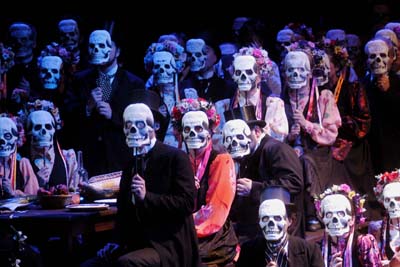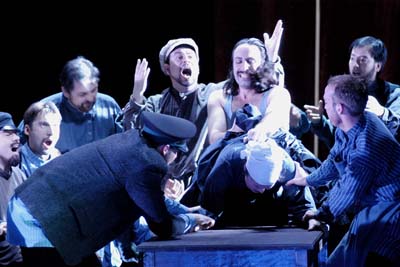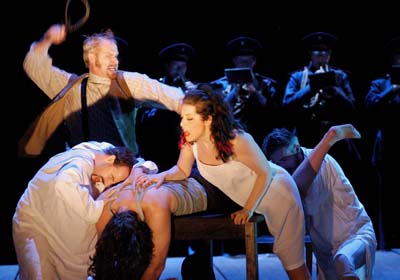Seen and Heard Internationa
Opera Review
Shostakovich, Lady Macbeth of Mtsensk
(in German), Soloists, chorus and orchestra at
Staatstheater Wiesbaden, Conductor: Fabrizio Ventura. Director:
Manfred Beilharz. Sets and costumes: Bernd Holzapfel, May 16,
2005 (SM)

Shostakovich's opera "Lady Macbeth of Mtsensk" is not
for the faint-hearted or people of a nervous disposition. Murder,
rape, sex, violence - it's all there, on stage and, more importantly,
in the composer's blistering, visceral score. No wonder some of
the Wiesbaden audience, all decked out in their finest for the
city's genteel "Maifestspiele" or May Festival, made
a rather shocked exit at the interval. In the first five scenes,
they had witnessed the brutal rape of a maid, had seen Katerina
sexually fantasizing (masturbating) in her bed, and then having
sex with Sergei. They were forced to watch Katerina's sadistic
father-in-law Boris whip Sergei to within inches of his life and
then see Boris himself die, writhing in agony after eating rat
poison. And finally, before the curtain came down for the interval,
they gaped in horror as Katerina and her lover strangled her husband
Zinovy to death.
You could almost hear Wiesbaden's haute-bourgeoisie concurring
with Stalin's denunciation of the opera in the infamous "Pravda"
article "Chaos instead of music" in 1936, even if the
blue-rinsed lady sitting next to me, who 'tut-tutted' noisily
at the (by Wiesbaden's standards) 'graphic' sex, would probably
have not understood the newspaper's charges of formalism. But
the yuppy couple in the row behind me, who constantly fidgeted
and huffed at what was going on on stage, would surely have wholeheartedly
agreed with Pravda's description of the music as a "dissonant,
confused stream of sound". Admittedly, Wiesbaden's red plush
"Staatstheater" is much too small for Shostakovich's
vast orchestra, with its huge battery of percussion instruments,
quadruple woodwind - complete with alto flute, piccolo clarinet
and contrabassoon - and shattering brass. Sitting in the stalls
was in fact quite deafening at times as we were turbo-blasted
by the house orchestra under Italian guest conductor Fabrizio
Ventura.
Such was the aural battering that I sometimes wished I were up
in the Gods, not just to turn the volume down, but also to get
a better "overhear" of what was coming out of the pit.
Indeed, with four percussion players having to be housed in two
side boxes on either side of the stage for space reasons, there
was sometimes the impression that we were sitting right in the
middle of the orchestra. Good for sheer adrenalin. But bad for
ear drums and I don't think I was the only to emerge at the end
of the evening with a bit of a headache. It was like being battered
around the head continuously for over three hours.

Similar things could be said of the singers. Katerina for one,
sung by Russian soprano Milana Butaeva, was larger - and louder
- than life. The sheer volume of her opening line, "I cannot
sleep", jolted a number of the grey-haired audience out of
their sneak early-evening snooze. Shostakovich insisted that he
had written vocal lines that were predominantly lyrical, making
it easier for the audience to sympathise with his murderous heroine.
One orchestra musician purportedly told the composer after the
1935 premiere that Katerina was more Desdemona than Lady Macbeth.
But while Butaeva pinned you to your seat with her sheer vocal
power, lyricism wasn't really one of her overriding qualities.
Here again, the small size of the Wiesbaden theatre tended to
work against her - a bigger house would have given her vocal lines
more space to unfold, and taken away some of the sharpness of
her steely soprano. Dan Chamandy was a real seed-bag of a Sergei,
but sexily so, so that we could understand why Katerina falls
for his animal attraction. Axel Wagner was malevolently spiteful
as Boris, and Johann Valdimarsson convincingly weak and despicable
as Zinovy. The smaller roles were also well taken, notably Sharon
Kempton as Aksinya, Erik Biegel as the Shabby Peasant and Sandra
Firrincieli as Sonyetka. And the house chorus was excellent. Whereas
the sheer musical volume nearly had the Staatstheater bursting
at the seams - and in some need of toning down - the same could
really not be said of the staging itself, directed by Wiesbaden's
own Intendant, Manfred Beilharz.

I don't mean to carp. Beilharz's story-telling was admirably straightforward
and faithful to the text. But diction, even in the German translation
of Alexander Preis' libretto, was only intermittently good. And
for those of us who don't belong to Wiesbaden's prim and well-heeled
subscription audience, it was all a trifle dull. Bernd Holzapfel's
sets were generically "expressionist", predictably skewed
and coloured in blood reds, blacks and purples. In fact, Katerina
and Co. appear to inhabit the same world as Wozzeck did in the
same team's production in Wiesbaden two years ago - a view given
added credence by Shostakovich's own claim that the inspiration
for his opera came after seeing a performance of Berg's masterpiece.
But it was all rather safe - Katerina and Sergei's love-making
was shielded from view by a uniformed brass band that marched
on to the stage now and again for no apparent reason, Katerina's
sexual fantasizing consisted of chastely stroking her bare legs
a couple of times. It was as if Beilharz wanted to shock, but
was afraid to go too far. It may be laudable for a house this
size to tackle such a work at all. And, at the end day, this was
good solid, committed music-theatre. But the question, in times
of limited budgets and dwindling audiences, is whether that really
is enough.
Simon Morgan

